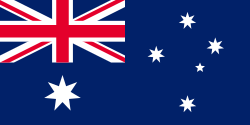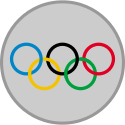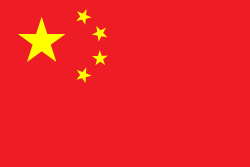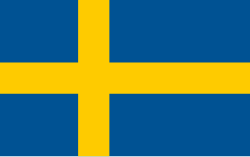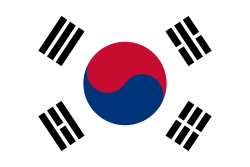Olympische Sommerspiele 2000/Tischtennis
| Tischtennis bei den Olympischen Sommerspielen 2000 | |
|---|---|
 | |
 | |
| Information | |
| Austragungsort | |
| Wettkampfstätte | State Sports Centre |
| Nationen | 48 |
| Athleten | 171 (86 |
| Datum | 16. – 25. September 2000 |
| Entscheidungen | 4 |
| ← Atlanta 1996 | |
Bei den Olympischen Spielen 2000 in der australischen Metropole Sydney wurden vier Wettbewerbe im Tischtennis ausgetragen.
Austragungsort war das State Sports Centre im Sydney Olympic Park.
Alle Goldmedaillen gingen an die Chinesen, ebenso fast alle Silbermedaillen. Lediglich der Schwede Jan-Ove Waldner erreichte im Einzel das Endspiel.
Bilanz
Medaillenspiegel
| Platz | Land | Gesamt | |||
|---|---|---|---|---|---|
| 1 | 4 | 3 | 1 | 8 | |
| 2 | — | 1 | — | 1 | |
| 3 | — | — | 1 | 1 | |
| — | — | 1 | 1 | ||
| — | — | 1 | 1 | ||
| Gesamt | 4 | 4 | 4 | 12 | |
Medaillengewinner
| Disziplin | Gold | Silber | Bronze |
|---|---|---|---|
| Männer Einzel | |||
| Frauen Einzel | |||
| Männer Doppel | |||
| Frauen Doppel |
Abschneiden der Deutschen
Herren
Am weitesten kam Jörg Roßkopf, der nach Siegen über Ashraf Helmy (Ägypten), David Zhuang (USA), Peter Karlsson (Schweden) und Toshio Tasaki (Japan) das Viertelfinale erreichte, wo er gegen den Chinesen Liu Guoliang verlor. Timo Boll scheiterte im Achtelfinale an Werner Schlager (Österreich), nachdem er Hamad Al-Hammadi (Katar), Liu Song (Argentinien) und Kim Taek-soo (Südkorea) besiegt hatte. Peter Franz gewann in der Vorrunde gegen Matthew Syed (England) und Jean-Patrick Sahajasein (Mauritius), ehe er in Runde 1 jedoch gegen Jörgen Persson (Schweden) ausschied.
Da das „Standarddoppel“ Roßkopf/Fetzner im Vorfeld die Qualifikation verfehlte[1] wurde aus den im Einzel qualifizierten deutschen Teilnehmern das „Notdoppel“ Roßkopf/Boll gebildet. Dieses blieb in der Vorrunde hängen: Ein Sieg gegen Brett Clarke/Jeff Plumb (Australien) und die Niederlage gegen Slobodan Grujić/Ilija Lupulesku (Jugoslawien) reichten nicht zum Weiterkommen.
Damen
Auch Qianhong Gotsch erreichte das Achtelfinale. Sie gewann gegen Rinko Sakata (Japan) und Suk Eun-mi (Südkorea) und verlor gegen Chen Jing (Taiwan). Jing Tian-Zörner schied sofort gegen Åsa Svensson (Schweden) aus, ebenso wie Jie Schöpp gegen Chen-Tong Fei-Ming (Taiwan).
Das Doppel Gotsch/Schöpp überstand die Vorrunde durch Siege über Xiao-Xiao Wang/Chris Xu (Kanada) und Gao Jun/Michelle Do (USA), scheiterte dann aber gegen die Ungarinnen Csilla Bátorfi/Krisztina Tóth. Ebenso weit kamen Schall/Struse, die in der Vorrunde gegen Tawny Banh/Jasna Reed (USA) und Li Chunli/Li Karen (Geschwister aus Neuseeland) gewannen und in Runde 1 gegen Li Ju/Wang Nan (China) ausschieden.
Literatur
Weblinks
Einzelnachweise
- ↑ Qualifikationsturnier in Rotterdam; hier blieb auch das Doppel Peter Franz/Torben Wosik auf der Strecke - Zeitschrift DTS, 2000/1 S. 20–21
Auf dieser Seite verwendete Medien
Pictograms of Olympic sports - Tennis. This is unofficial sample picture. Images of official Olympic pictograms for 1948 Summer Olympics and all Summer Olympics since 1964 can be found in corresponding Official Reports.
Flag of Australia, when congruence with this colour chart is required (i.e. when a "less bright" version is needed).
See Flag of Australia.svg for main file information.Autor/Urheber: maix¿?, Lizenz: CC BY-SA 2.5
A gold medal with the olympic rings inside
Autor/Urheber: maix¿?, Lizenz: CC BY-SA 2.5
A silver medal with the olympic rings inside
Autor/Urheber: maix¿?, Lizenz: CC BY-SA 2.5
A bronze medal with the olympic rings inside
Chinese Taipei Olympic Flag. According to the official website of Chinese Taipei Olympic Committee, Blue Sky(circle) & White Sun(triangles) above the Olympic rings is neither the National Emblem of the Republic of China, nor the Party Emblem of Kuomintang (KMT), but a design in between, where the triangles do not extend to the edge of the blue circle, as registered at International Olympic Committee in 1981 and digitally rendered in 2013. Besides, the blue outline of the five-petaled plum blossom is broader than the red one. Moreover, the CMYK code of the blue one and the Blue Sky & White Sun is "C100-M100-Y0-K0", and different from the Olympic rings (C100-M25-Y0-K0). Note that it's the only version recognized by IOC.
Chinese Taipei Olympic Flag. According to the official website of Chinese Taipei Olympic Committee, Blue Sky(circle) & White Sun(triangles) above the Olympic rings is neither the National Emblem of the Republic of China, nor the Party Emblem of Kuomintang (KMT), but a design in between, where the triangles do not extend to the edge of the blue circle, as registered at International Olympic Committee in 1981 and digitally rendered in 2013. Besides, the blue outline of the five-petaled plum blossom is broader than the red one. Moreover, the CMYK code of the blue one and the Blue Sky & White Sun is "C100-M100-Y0-K0", and different from the Olympic rings (C100-M25-Y0-K0). Note that it's the only version recognized by IOC.
Flag of South Korea from October 1997 to May 2011. In May 2011, the exact colors were specified into their current shades.
Olympic Rings without "rims" (gaps between the rings), As used, eg. in the logos of the 2008 and 2016 Olympics. The colour scheme applied here was specified in 2023 guidelines.
Olympic Rings without "rims" (gaps between the rings), As used, eg. in the logos of the 2008 and 2016 Olympics. The colour scheme applied here was specified in 2023 guidelines.
Unicode Geschlechtersymbolder

